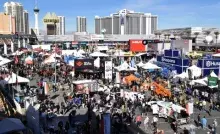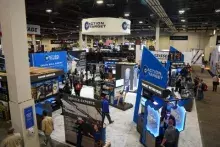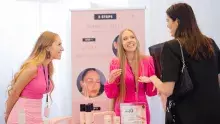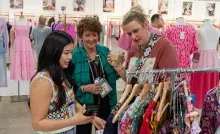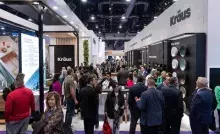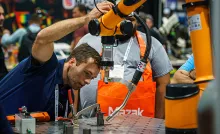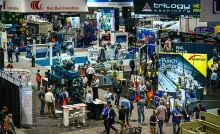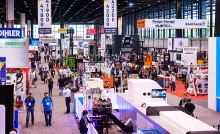Any business owner knows that retaining business is much easier (and more cost-efficient) than winning new clients. Despite this widely acknowledged truth, the expo industry seems to be working against itself by adding unnecessary hurdles for customers. The numbers speak volumes, particularly in terms of exhibitor churn.
Drawing inspiration from other industries, software as a service (SaaS) showcases impressive B2B customer retention rates, averaging between 92% to 97%
Technology companies are well-versed in the customer journey and invest many resources to ensure the success of their customers. This is not a process I’ve seen replicated in the trade show industry, as anyone who has ever exhibited will know. It’s safe to say that the majority of expo organizers do not put themselves through their own exhibitor journey. If they did, it would be a game-changer because I can tell you—from the initial booth sale through to the show itself—it is the Wild West for exhibitors.
This isn't simply a bystander observation. It comes from my own experience exhibiting at trade shows and being the one strategically responsible for our booth activations at expos around the world. The process of exhibiting is quite simply broken. My team had to repeatedly enter the same basic information over and over again; the time it takes to access critical details for the event, which eventually arrives in a 100-page document, and being constantly pushed from organizer to venue to supplier, makes exhibiting exhausting.
It's a frustration that made us question, at a board level, the value of exhibiting and resulted in us altering how we measure ROI from our exhibits to ensure the additional time resources taken pre-event to exhibit were added to our internal calculations to evaluate success.
For large corporations, much of this administrative work falls to exhibit marketers or marketing teams who should be investing their time in creating activations that wow and excite attendees but instead are being weighed down by the results of organizers not streamlining the customer experience.
In many other industries, businesses work incredibly hard to make it easier for customers. The old adage “Don’t make me think” is why businesses such as Amazon have won because they know that if it is too hard for customers, they very quickly become detractors. Ex-Amazon employees tell stories of how Jeff Bezos would bring an additional empty chair into the boardroom to represent the ‘customer’ during any decision-making process.
"Customers that are at risk of churning won’t necessarily inform you. Don’t expect them to send you an email stating that they’re losing confidence and are about to churn. And while NPS surveys can help you identify detractors—who are most likely to churn—surveys won’t reveal insights into customers who chose not to give feedback."
“Was it difficult to exhibit?” is not a question we ask in our post-event feedback, instead prioritizing ‘return’ and ‘value’. Our Western ‘work hard’ culture would be stunned to hear that people were canceling booths because it was ‘too hard’. But if someone wants to find an excuse to cancel their participation, business time and ‘lift’ can become legitimate business reasons.
Fortunately, enhancing the exhibitor experience and reducing churn shouldn’t pose a significant challenge for organizers. We have a captive audience and an offer that is built on human connection. It’s now time to maximize technology and adopt processes inspired by other industries to streamline the customer journey.
For instance, the first time a company exhibits at your trade show should be the first and only time they complete company information. This can be easily achieved through the implementation of appropriate technology solutions and partnerships. It's imperative that we, as organizers, take the lead in reevaluating our processes to ensure their suitability for 2024 and beyond.
However, the responsibility extends beyond our individual organizations. It's crucial to ensure that the entire event ecosystem—venues, suppliers, hoteliers, etc.—is also committed to delivering an exceptional exhibitor experience. Together, we must acknowledge the pivotal role of exhibitors in driving future growth and sustainability in the expo industry and collaborate to establish partnerships that make exhibiting not only effortless but dare I say it—enjoyable!"
Don’t miss any event-related news: Sign up for our weekly e-newsletter HERE, listen to our latest podcast HERE and engage with us on LinkedIn!
Homepage
Featured News
Feb 21, 2025
To send in your exhibit or show photos, please contact: news@tsnn.com
Partner Voices

MGM Resorts is committed to fostering an inclusive and diverse culture, not just among employees and guests but also within its supply chain. The company prioritizes procuring goods and services from businesses owned by minorities, women, veterans, people with disabilities, LGBTQ individuals and those facing economic disadvantages. This commitment is integral to MGM Resorts' global procurement strategy.
Through its voluntary supplier diversity program, MGM Resorts actively identifies and connects certified diverse-owned suppliers to opportunities within its supply chain. The company is on track to spend at least 15% of its biddable procurement with diverse-owned businesses by 2025, demonstrating that supplier diversity is not only a social responsibility but also a strategic business imperative.
Supplier diversity isn’t just the right thing to do – it’s good for business. A diverse supply chain allows access to a broader range of perspectives and experience, helping to drive innovation, entrepreneurship and resilience, while strengthening communities. At MGM Resorts, engaging diverse suppliers ensures best-in-class experiences for guests and clients. Supplier diversity ensures a more resilient supply chain while supporting economic development in the communities in which it operates.
The impact of MGM Resorts' supplier diversity initiatives is significant. In 2023, these efforts supported over 3,500 jobs across more than 30 states, contributed over $214 million in income for diverse-owned businesses and generated more than $62 million in tax revenue. The story extends beyond the numbers – it reflects the tangible benefits brought to small and diverse-owned businesses, fostering economic empowerment in their communities.
MGM Resorts also supports the development and business skills of diverse-owned businesses through investment, mentorship and education. Through the MGM Resorts Supplier Diversity Mentorship Program, the company identifies, mentors and develops diverse-owned businesses to fill its future pipeline, while providing businesses with tools and resources to empower and uplift. Since 2017, the program has successfully graduated 105 diverse-owned businesses and is on track to achieve its goal of 150 graduates by 2025.
MGM Resorts’ commitment to supplier diversity not only enhances its business operations but also plays a crucial role in uplifting communities and fostering economic development. This approach reinforces the idea that diversity is a powerful driver of innovation and resilience, benefiting both the company and the wider community.














